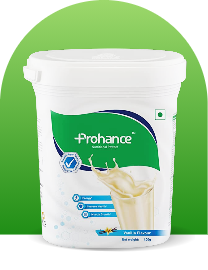
When you are trying to gain muscle, only hitting the gym every day is not enough! A high-protein diet for muscle building is equally important. Because after you work out at the gym, a muscle building diet with all the required post-workout nutrition, including a high-quality protein powder for muscle growth plays an
important role in supporting you in building lean muscles.
It’s understandable that one may struggle to curate the best diet for muscle gain. Therefore, this page delves deeply into an effective diet plan for muscle gain to fuel your body to achieve effective muscle growth, focussing on the relevance of carbohydrates for muscle recovery, the significance of a calorie surplus for muscle gain, the best foods for muscle growth, and a lot more.
Muscle gain necessitates a calorie surplus, which means you eat a greater amount of calories than you consume. However, it is not enough to simply eat more; you must also eat the right foods in order to grow muscle, not fat.
Now, let’s get into the breakdown of the essential nutrients and their sources of what you should be eating and preparing a diet plan for muscle gain!
| Nutrient | Why Should You Take Them? | Sources |
Carbohydrates
| Carbohydrates are essential for generating energy and storing glycogen for healthy muscular growth and help in muscle recovery. | Wheat, potatoes, rice, oats, sweet potatoes, chickpeas, and fruits like apples, watermelon, mango, and more. |
| Protein | Proteins are vital for muscle repair and growth. They are the building blocks of muscle; thus, you must consume adequate amounts of it. | Peanuts, fish, lean meats, eggs, milk, paneer, almonds, beans, lentils, legumes, and so on. |
| Healthy fats | Healthy fats promote the production of hormones and cell function. | Nuts, avocados, flaxseeds, olive oil, sesame, tofu, and pumpkin seeds, among others. |
First, Calculate the Number of Calories You Need
The simplest way to figure out the amount of calories you require is to weigh yourself a minimum of three times per week and record everything you eat with a calorie-counting app.
If your weight remains constant through the week, the number of calories you consume is considered your “maintenance” level. You are maintaining your weight rather than losing or gaining it.
During the bulking phase, aim to increase your calorie consumption by around 15%. For instance, if you consume 3,000 calories per day to maintain your weight, you need to consume around 3,450 calories per day to bulk (3,000 x 0.15 = 450).
Adjust your calorie goals on a monthly basis to reflect weight changes. Aim for small progress—gaining or losing not more than 0.5-1% of your body weight every week—to keep muscle during cutting while minimising fat gain while bulking.
Next, Find Out Your Macronutrient Ratio
This is the proportion of your carbohydrate, fat, and protein intake. Protein and carbohydrates give about 4 calories/g, whereas fat gives around 9 calories.
Your macronutrient ratio remains consistent irrespective of whether you are bulking or reducing. A normal diet involves:
Pro tip: It is best to speak with a qualified dietician to evaluate your specific nutritional requirements and ensure that your diet is adequate.
Foods to Incorporate in the Diet Plan for Muscle Gain
Incorporating nutrient-dense foods into a diet plan for muscle gain is critical to getting the desired outcomes; however, the amount of the following foods will vary depending on individual health goals.
Foods that you can incorporate in your daily diet plan for muscle gain include:
Foods you should limit to optimise your diet plan for muscle gain include:
Sample Muscle Building Diet Plan
Usually, a lot of people think that they need to eat fancy and shell a lot of money for building muscle; however, it’s all about making some smart choices, and just a well-curated meal plan for muscle gain is sufficient for this.
The Indian diet is the best diet for muscle gain for those who want to build muscle as well as in a budget. It is a powerhouse of nutrients that promotes muscle growth.
Following is a sample diet plan for muscle gain that emphasises balance and the right macros for muscle gain to fuel your body:
Try the Nutrition Calculator to get detailed insight on your daily meal
Sample Diet Plan for Muscle Gain (For Vegetarians)
Breakfast
Snack (Mid-morning)
Lunch
Snack (Afternoon)
Snack (Pre-workout)
Snack (Post-workout)
Dinner
Sample Diet Plan for Muscle Gain (For Non-Vegetarians)
Breakfast
Snack (Mid-morning)
Lunch
Snack (Afternoon)
Snack (Pre-workout)
Snack (Post-workout)
Dinner
Incorporating protein powder in your muscle-building diet can be one of the most efficient ways to achieve your daily protein needs. It is simple to digest, convenient, and can be tailored to your preferences and requirements.
Advantages of protein powder for muscle gain:
Consult Now & get personalized guidance to improve your health and wellbeing
Follow these tips for your meal prep for bodybuilding:
Accomplishing your fitness goals requires more than simply working out; it also involves fuelling your body with the right diet plan for muscle gain. Incorporating nutrient-dense foods, keeping proper macro balance, and supplementing with high-quality products such as Prohance protein powder can make a big difference. Including Prohance protein powder in your diet allows you to easily satisfy your daily protein needs while also boosting muscle growth and recovery.
Begin your muscle building journey now with a lean bulk diet plan, and watch your progress unfold!
